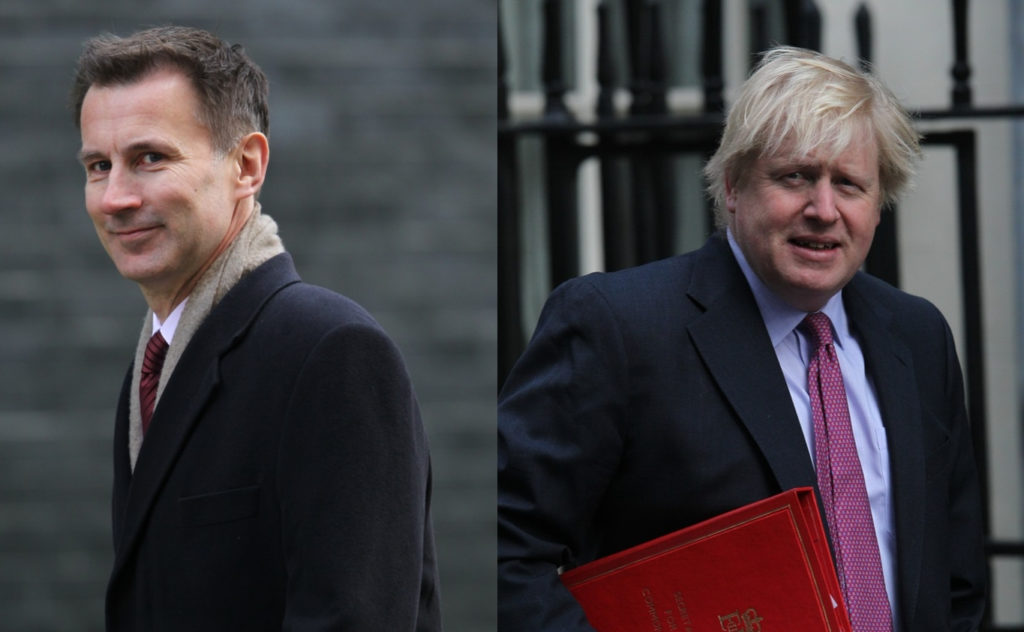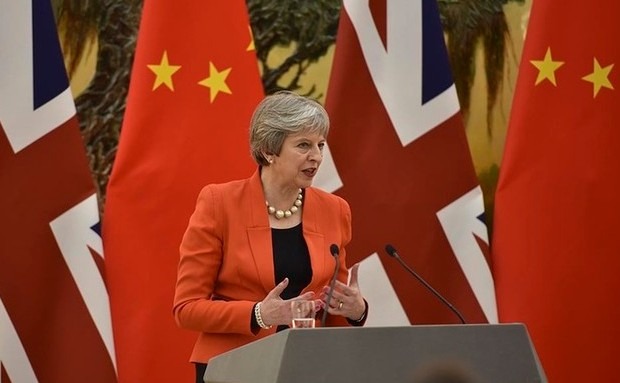Retaining your EU rights before Brexit
Update: June 2019, ‘No deal’ Brexit still looks unlikely

Jeremy Hunt and Boris Johnson are slugging it out to become Prime Minister (Twocoms / Shutterstock.com)
The Conservative leadership race has narrowed to Boris Johnson and Jeremy Hunt, with the former currently the favourite to win the Conservative Party members’ ballot. This will be announced soon after 22 July. With both candidates generally considered to be on the centre of the party politically, the main bone of contention is who would be likely to get a result – any kind of result – on Brexit.
Both have said they would be willing to take the UK out of Europe with no deal. Boris Johnson said the UK would leave on 31 October “come what may, do or die”. However, he later declared that the chances of Britain leaving the European Union without a deal are “a million-to-one”.
Johnson has said he believes it is ‘perfectly feasible’ to renegotiate the Withdrawal Agreement with the European Union. That remains to be seen, but there is certainly an attempt at moving forward on some of the thornier issues surrounding the negotiations. The Alternative Arrangements Commission, a thinktank with the backing of a number of Conservative MPs, has published recommendations for avoiding the Irish backstop which, it claims, could be implemented within three years.
For his part, Jeremy Hunt has said that as a skilled entrepreneur and negotiator, who has managed to retain some respect among the EU27 leaders (unlike his opponent), he would have a better chance of getting the original Withdrawal Agreement changed by the EU, and then through the House of Commons.
Looking at the arithmetic of the Commons, there is also the possibility that sufficient rebel Labour MPs will vote for the deal, rather than risk no deal or no Brexit. It also seems likely that various devices will be adopted by the opposition parties and rebel Conservative MPs to block a no deal Brexit.
Which all leave us…
Assuming the above is true, we might be able to draw several conclusions.
No deal is still an unlikely outcome. However, even if that does happen, do overseas buyers really need to worry? The simple answer is no. We’ve explained before how you can move to Spain even in the event of a no-deal, but that actually looks more unlikely than the media would have you believe. It looks improbable that any Prime Minister could command a majority in the House to back a no-deal if it came to it.
If a deal or extension is cobbled together, the original implementation period allowed two years for those within the countries to sort out their affairs. It also allowed British people two years to move to the EU27 with all their EU rights. Clearly this cannot be guaranteed, but seems more likely than not.
Update: May 2019
Extension to 31 October, potential transition period to 2022
Headlines:
The other 27 nations of the EU have granted the UK a “flexible extension” to its membership of the EU until the 31 October. This means that if Theresa May gets her Withdrawal Agreement passed before then the UK will leave the EU earlier.
The UK is now taking part in the European elections on 23 May.
At the same time, the government has, according to most reports, now abandoned its No Deal planning as it believes that we will never leave the EU without a deal.
However, with the long-term future of Theresa May as Prime Minister in doubt – especially following the Euro election results – and it likely that she will be replaced with a “harder” Brexiteer Conservative Party leader, No Deal still cannot be discounted. Neither, if a Boris Johnson-type PM cannot get Brexit passed, can a General Election.
Mr Barnier has said that if and when the Withdrawal Agreement passes a new transition period will start and continuing to December 2022.
From the EU’s side, Jean-Claude Juncker said the EU was ready for No Deal. “We have adopted the necessary contingency measures and we are ready for a no-deal Brexit,” he told MEPs.
Mr Barnier, the EU’s chief negotiator, has said that if and when the Withdrawal Agreement passes a new transition period will start and continuing to December 2022.
Next stage of the process
At the time of writing talks between the Government and Labour Party are continuing. According to some sources a deal is 99% done, while others say they have little real hope of a positive outcome! If a compromise deal can be reached, MPs will vote on it. If passed, the UK will leave the EU as soon as possible and the transition period will start, to around 2022.
If MPs reject a deal worked out between Labour and the Government, the next stage is unclear, but MPs are likely to vote on another set of indicative votes with six main possibilities:
- Passing Theresa May’s Withdrawal Agreement
- A full renegotiation of Brexit
- Another referendum
- Cancelling Brexit
- A General Election
- Leaving with no deal
- A combination of the above, such as the Withdrawal Agreement plus a comfirmatory referendum
What this means for property buyers
Holiday home-owners
For holiday home-buyers, whatever happens with Brexit their right to buy in Spain and spend a large proportion of the year there will be unaffected. Why? Because property ownership is not one of the “four freedoms” of the single market and anyone – even Americans, Australians etc – can buy.
Moreover, those “third country nationals” (as Americans, Australians etc are classified, and the British probably will be too) will be able to travel visa free to their property probably for up to six months of the year. They will probably have to take out private health insurance, however, and may not be allowed to work.
Retirees and relocators
There is possibility that “freedom of movement “ doesn’t end, either through Brexit being cancelled via a second referendum or by a softer version of Brexit. In which we will continue to be able to relocate to EU countries just as now.
Perhaps more likely, given that both the Government and Labour have committed to Brexit and ending freedom of movement, is that restrictions are put in place under some version of Brexit. That may mean British people can retire to the EU but not work. That’s the situation with other third country nationals such as from America and Australia.
Transition period
The transition period based on a 29 March 2019 leaving date was December 2020. British people had that period to establish residency in EU countries and retain all their EU rights. For life. And not just for them, but for their spouse and dependent family too.
The new transition period, assuming the UK leaves by 31 October 2019, is likely to be December 2022. So if you are planning to move to an EU country and wish to retain your right to free healthcare, to work, study and live just an any other EU citizen, you should have well over two years to do so.

Update: June 2018, Government offers detail on citizens’ rights
- Home Secretary urges EU to speed up plans for UK expats in Member States
- UK government publishes plans and demands EU does same
- If you have previously lived abroad but returned to UK, you could retain rights
- UK government says it wants to secure reciprocal rights even if you move after Brexit.
- Even in the event of no final deal bring agreed, UK will follow through on citizens rights.
- No agreement on “onward movement” within EU.
UK announces residency plans, awaits EU response
Under plans from the UK government announced this week, the process by which EU citizens in the UK can apply to continue living here will amount to proving three simple questions: who are you, where do you live, do you have any (serious) criminal convictions. Moreover, they will be able to answer the questions via a mobile app or online, for example by taking a photo of their address. The authorities will then check this against existing databases.
The question is, will EU nations where the British live adopt similar rules and procedures?
The cost for their “settled status” application will be £65 or adults and £32.50 for children. EU citizens in the UK will be able to apply via the system from “the start of next year” up until at least June 2021, said the Home Secretary. The question is, will EU nations where the British live adopt similar rules and procedures?
The UK has been putting pressure on the EU to provide information on its planned procedures for UK nationals resident in the EU to secure their on-going residency status after Brexit. According to Home Secretary Sajid Javid, the European parliament’s Brexit co-ordinator, Guy Verhofstadt, has accepted that the EU’s 27 member states need to do more to reassure expat Britons in the EU about what to expect post-Brexit.
Reciprocal healthcare
A Government statement on Brexit also released this month should reassure expat pensioners concerned about their healthcare rights after Brexit. The government, highlighting how citizens’ rights to reciprocal healthcare remains a primary condition in any deal with Brussels.
Responding to recommendations raised by the House of Lords, the Government stated: “It has been clear that safeguarding the rights of EU citizens living in the UK and UK nationals living in the EU is a top priority. Through negotiations we have reached a fair agreement on citizens’ rights, grounded in reciprocity, which seeks to allow citizens to continue living their lives broadly as they do now.”
Indications are that both parties have found common ground on the issue of healthcare. “We have reached a reciprocal agreement in principle on healthcare arrangements to those UK and EU citizens who move countries during the implementation period,” continued the Government’s statement. “This was reflected in the updated draft Withdrawal Agreement text presented at the March European Council.”
Return to the Continent
The Government’s draft deal would accommodate Britons who have at some point lived in another EU country before the implementation period ends on 31 December 2020. “For example, a UK national who has worked for a year in Spain, but has returned to live in the UK prior to the end of the implementation period and retires to France upon reaching state pension age, could be covered for reciprocal healthcare in France when they export their state pension,” said the statement. “This would also include a UK national who is exporting a UK state pension to Spain at the end of the implementation period.”
No deal, no problem
Under the principle that “nothing is agreed until everything is agreed”, could all the rights and procedures agreed so far be abandoned? This was the question put by a House of Lords committee last week. In response the UK said this was unlikely: “providing certainty for citizens was a priority and we believe it would be unlikely for any deal on citizens’ rights agreed early on to be reopened.”
No onward movement agreement
Many British people already living in the EU, or about to move, have expressed concern that their rights are only based on the country where they reside. For example, a UK citizen resident in France will have no right to move to Spain, under current plans. The government could offer no help here, however, saying: “We understand that onward movement is an important issue for many UK nationals living in the EU, and the UK pushed strongly for this to be included during the first phase of negotiations. However, the EU made clear that it was not ready to include it in the Withdrawal Agreement.”
Healthcare for those who move after Brexit?
The UK government has acknowledged the fears of those who will not live in the EU before Brexit, and those who simply go on holiday, that the EHIC system will end. “We understand the importance of maintaining reciprocal healthcare arrangements for needs-arising treatment for those with chronic conditions, disabilities or other long-term conditions that require ongoing medical attention. This is why we have been clear that we want to continue with the EHIC scheme in any future agreement.”
However, they say this is a subject beyond the scope of the current talks and will be debated in the next phase of negotiations. The government has noted, however, that the UK does have arrangements with other non-EU countries, such as Australia and New Zealand. While these are generally only related to emergency healthcare, rather than the long-term conditions that many UK retirees in the EU suffer, the government says: “This demonstrates that reciprocal healthcare agreements are not dependent upon EU free movement rules.”

UPDATE: 19th March 2018. Transition deal agreed.
The British and EU negotiating teams announced on 19th March 2018 that the UK’s transition period with the EU post-Brexit will continue to 31st December 2020. This extends by 21 months the period during which UK citizens can move to Spain and claim the same rights as before Brexit (see below). When you have become legally resident, which is a simple procedure (see below), you will retain your right to reside, work, study or open a business in Spain. You will also retain your rights to subsidised healthcare and a state pension.
The deal announced by the UK’s lead negotiator David Davis and the EU’s Michel Barnier means you should have longer than you first thought to move to Spain and receive the same EU rights as British expats who relocated pre-Brexit. We say “should” because as Mr Barnier said: “Nothing is agreed until everything is agreed.”

Michel Barnier (right) and David Davis. (Alexandros Michailidis / Shutterstock.com)
The deal could still unravel, but this seems unlikely, and you can plan your new life in Spain with confidence. After the official Brexit day on 29th March 2019, the UK will enter an ‘implementation phase’. This will last until 31st December 2020.
As well as helping businesses to plan, the transition phase will help UK citizens in Spain to sort out their affairs, apply for residency and find somewhere to live, all without the panic that the March 2019 deadline had been creating for many of our readers. It will be of immense help both to those already in the final throes of moving to Spain, and those still in the planning stage.
It is especially good news for British people retiring in Spain, or with more complex and expensive health needs. The right to transfer your state healthcare benefits and receive an annual uprating in your UK pension is guaranteed at least until the end of 2020. That means that retirees will receive the “triple lock”, a pension that rises in line with inflation, average earnings or 2.5%, whichever is greater.
UPDATE: 1st February 2018. Transition deal won’t include right to move
The Prime Minister Theresa May refused to allow the transition period to include the right to free movement of EU citizens to the UK. If reciprocated, it means that you have until March 2019 to move to Spain.
Many people thinking of moving to Spain will be worried that they will face restrictions after Britain leaves the EU. In our recent survey four out of every ten of our readers were worried by Brexit.
The news in December 2017 that an initial agreement had been reached not only sent the pound shooting up in value, but was a very welcome Christmas present to the British people hoping for a long, affordable and relaxed life in Spain. It spelled out the rights of people moving to Spain until March 2019: “There will be no change to the rights and status of UK nationals living in the EU while the UK remains in the EU.”
It was also assumed that this would be extended until December 2020 as part of the “status quo” transition period. However, this week Theresa May said, “I’m clear there is a difference between those who came prior to us leaving and those who will come when they know the UK is leaving.”

Theresa May made the comments while in China
This has caused immediate outrage. Guy Verhofstadt, the European parliament’s Brexit coordinator, told the Guardian newspaper: “Citizens’ rights during the transition are not negotiable. We will not accept that there are two sets of rights for EU citizens. For the transition to work, it must mean a continuation of the existing acquis with no exceptions.” The “acquis” include free movement – so any transition period must include the right to move to an EU country, says Mr Verhofstadt. British politicians have joined in, with prominent Conservative “Remainer” politician Anna Soubry tweeting that the Prime Minister was using EU citizens’ rights to satisfy hard-core Brexiteers.
Already convinced? If you’re ready to buy a home in Spain, Property Guides will be at Your Overseas Home, where those serious about buying can get answers to detailed questions from trusted lawyers, agents and currency providers. Click here to apply for FREE tickets to shows throughout 2018
However, for British people wanting to move to Spain, the message is clear that only by living in Spain before 29th March 2019, when the UK leaves the European Union, will your right to live in Spain be guaranteed.
The agreement on 8th December essentially says the following:
• UK nationals who are lawfully residing in Spain by 29th March 2019, will be able to continue to reside in Spain.
• That includes children born or adopted outside Spain after the 29 March 2019.
• Close family members (spouses, civil partners and unmarried partners, dependent children and grandchildren and dependent parents and grandparents) will be able to join you in Spain after exit under these rules, so long as the relationship existed on 29 March 2019 and continues to exist when they join you in Spain.
• Spain may require UK nationals and their family members covered by the agreement to apply to obtain a status conferring the right of residence and/or obtain a residency document. However, the paperwork for applications will be kept simple, free or low cost, and you will have at least two years to submit your application.
• You and your family members can leave Spain for up to 5 years without losing your right to return.
• You and your family will continue to have the same access as you currently do to healthcare, pensions and other benefits.

Let Smart take the risk out of your currency transfers
Whether you are buying a property abroad, making regular payments or sending money back to the UK, you will want to protect the value of your currency transfers from fluctuating exchange rates. That’s where Smart Currency Exchange can help. We minimise the risk associated with transferring money overseas by providing expert guidance every step of the way.
Protect your currency costs
Although this seems straightforward, the key phrase is “lawfully residing”. What do you need to do to be lawfully residing? We spoke to Raquel Perez of Perez Legal Group: “As soon as you arrive in Spain and buy or rent a property, you can declare your resident of Spain.” She explains that being a legal resident is more than simply signing the padrón at the town hall. You are required to declare yourself resident for tax purposes anyway after you have been in Spain continuously for six months, but you do not need to wait that long.
You apply at the Oficina de Extranjeros in your province or at a designated police station.
“When you go to the police station to register,” says Raquel Perez, “you have to show a Spanish address/domicile, and to buy or rent a property you have to get your NIE number.” So while an NIE number (which all foreigners have to obtain in Spain) is required to get residency, it does not in itself grant residency. Complicated? It’s actually very simple, says Raquel, for British people to become legally resident and protect their rights to live and work in Spain for ever: “Say you arrive in Spain on 1st February and complete on or rent a house on 2nd February. On 3rd February you can become a legal resident in Spain.”
That is not quite the end of the story, however. Being legally resident in Spain does not give you the right to become a burden on the Spanish state. According to the rules on the website of the Spanish Ministry of the Interior EU nationals, including those British people resident before March 2019, must either be working, self-employed, a student or able to support themselves financially. Employed workers will need to show contracts and an employer’s social security number. Self-employed people must show evidence such as a registration on the Mercantile Registry or via evidence of social security payments.
If you don’t work you must show evidence of health insurance, although in the case of British retirees this will be covered by an S1 form from the UK. You may also have to show a bank balance of €6,000 for an individual or €10,000 for a couple.
British families apply pressure
The right to bring family to Spain is extended to children and grandchildren of the legal resident. This opens up another angle for British people who wish to retain their EU rights but are not in a position to move to Spain yet. Previously the easiest option looked to be claiming an Irish passport, which you can do if a grandparent was Irish. With 779,000 Irish passports issued in 2017 being the highest number since records began, this has clearly been a popular option. Perhaps a less bureaucratic approach, and would provide greater fringe benefits, would be to encourage a family member to move to Spain.
That was the option of Katy Wheeler from Sussex: “My mother-in-law was proudly boasting of voting for Brexit. I think it is fair to say that she regrets telling her four children and 10 grandchildren, who are all keen remainers! Now we are suggesting that she might like to go and live in Spain for a while so we can all enjoy the right. We don’t know of the ins and outs of how it might all work, but it looks as though buying a home in Spain and living there for a year or two will be to everyone’s benefit. Frankly it’s the least she can do!”
Although only one person needs to become legally resident in Spain for the whole family to benefit, the cost of buying the home can be spread among many. Read our brand new guide, Buying Abroad with Family to see how to organise the legal and financial aspects.

